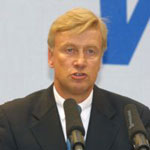

 On 28 February 2004 Hamburg's First Mayor Ole von Beust won a famous victory in Hamburg election Erster Bürgermeister (First Mayor) Rathaus Rathausmarkt 1 20095 Hamburg Germany Internet: www.hamburg.de  FRONT PAGE SiteSearch About us Directories  German local elections 2009 German business cities German business locations German population German trade fairs Hamburg government  City Mayors reports news from towns and cities around the world. Worldwide | Elections | North America | Latin America | Europe | Asia | Africa | Events |  Mayors from The Americas, Europe. Asia, Australia and Africa are competing for the annual World Mayor Award. More  City Mayors ranks the world’s largest as well as richest cities and urban areas. It also ranks the cities in individual countries, and provides a list of the capital cities of some 200 sovereign countries. More  City Mayors lists and features urban events, conferences and conventions aimed at urban decision makers and those with an interst in cities worldwide. More  City Mayors reports political events, analyses the issues and depicts the main players. More  City Mayors describes and explains the structures and workings of local government in Europe, The Americas, Asia, Australia and Africa. More  City Mayors profiles city leaders from around the world and questions them about their achievements, policies and aims. More  City Mayors deals with economic and investment issues affecting towns and cities. More  City Mayors reports on how business developments impact on cities and examines cooperation between cities and the private sector. More  City Mayors describes and explains financial issues affecting local government. More  City Mayors reports urban environmental developments and examines the challenges faced by cities worldwide. More  City Mayors reports on and discusses urban development issues in developed and developing countries. More  City Mayors reports on developments in urban society and behaviour and reviews relevant research. More  City Mayors deals with urban transport issues in developed and developing countries and features the world’s greatest metro systems. More  City Mayors examines education issues and policies affecting children and adults in urban areas. More  City Mayors investigates health issues affecting urban areas with an emphasis on health in cities in developing countries. More  City Mayors examines the contributions history and culture make to urban society and environment. More  City Mayors examines the importance of urban tourism to city economies. More  City Mayors describes the history, architecture and politics of the greatest city halls in the world. More  City Mayors invites readers to write short stories about people in cities around the world. More  City Mayors questions those who govern the world’s cities and talks to men and women who contribute to urban society and environment. More  City Mayors profiles national and international organisations representing cities as well as those dealing with urban issues. More  City Mayors reports on major national and international sporting events and their impact on cities. More  City Mayors lists cities and city organisations, profiles individual mayors and provides information on hundreds of urban events. More |
This archived article was published in February 2004 Mayor von Beust to govern alone after victory in Hamburg election Hamburg Mayor Ole von Beust won an absolute majority in elections held on 29 February 2004. His party, the Christian Democrats (CDU) received 47.2 per cent of the vote. The opposition Social Democrats netted only 30.5 per cent, their worst result in a city they dominated until von Beust formed a right-of-centre coalition in 2001. Mayor von Beust will now be able to form a governing administration without needing the support of any other party. 2008 election: Mayor von Beust loses absolute majority and contemplates coalition with the Green Party. Not even an excellent result for the Green party, who are in a national coalition with the SPD, could rescue the Hamburg Social Democrats. The Greens won 12.3 per cent of the vote, almost four percentage points more than in 2001. Hamburg’s 1.2 million voters have not been immune to the rising unemployment in Germany and the stagnating economic growth that have dogged Schröder’s government since he first came to power in 1998. The city-state, which last year had Germany’s highest per capita gross domestic product and gross wages, also has a jobless rate that rose from 8.3 per cent in 2001 to 9.9 in 2003. Another clear loser in the Hamburg election was the Party for a Law-and-Order Offensive. The party rode a wave of paranoia and law enforcement concerns to victory following the 9/11 attacks in 2001. But party leader Ronald Schill left both the party and the government after allegations that he planned to expose a homosexual affair between von Beust and a city official. The party failed to reach the five per cent hurdle for representation in the city parliament, winning only 3.1 per cent of the vote. The liberal Free Democrats (FDP) also suffered from the von Beust effect and, with a share of only 2.8 per cent of the vote, are no longer represented in Hamburg’s city parliament. (Source: Deutsche Welle) |
 |